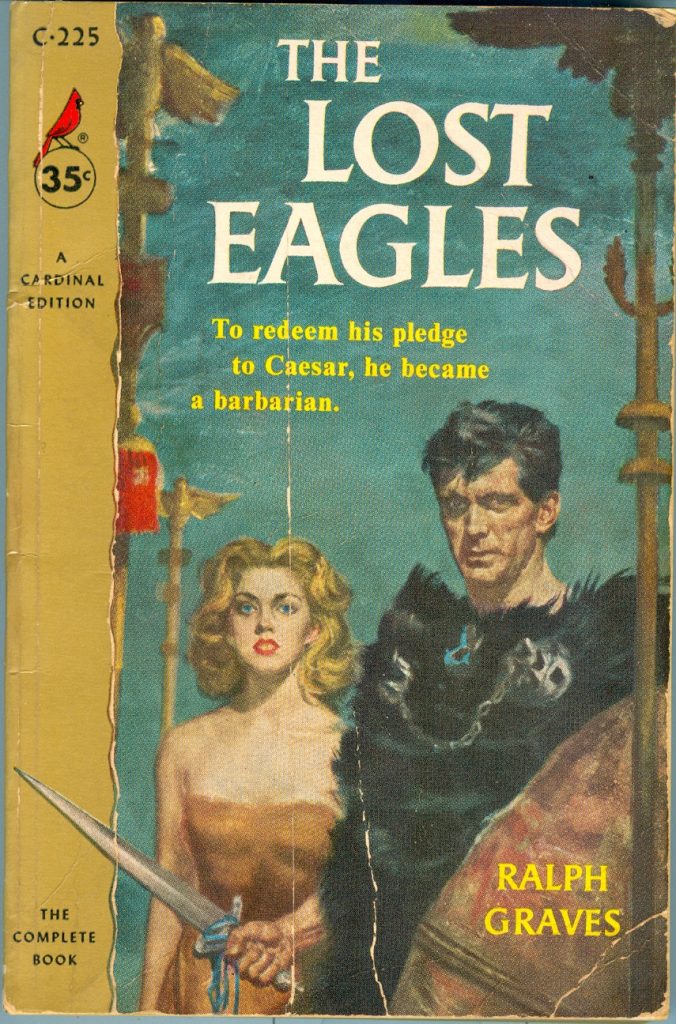
The Lost Eagles by Ralph Graves was a pleasant surprise for a novel by a writer I never heard of before. I have been on an historical novel binge the past month. My personal belief is a good historical is harder to write than a fantasy. There are constraints built in the historical that don’t allow easy outs the way a fantasy novel can.
The Lost Eagles was first published as a hardback in 1955 by Alfred A. Knopf. The paperback was reprinted a year later under the Cardinal imprint of Pocket Books. I have a few other historicals from Cardinal.
I had never heard of Ralph Graves but a little research uncovered he was a writer and later editor for Life magazine. He also wrote a handful of novels over decades covering more than one genre. In addition to The Lost Eagles, the other historical from 1990 is set in the Philippines in WW2.
The setting for Eagles starts in the last years of the reign of the Roman emperor Augustus. Young Severus Varus is about to finish training and join the Roman legions. Disaster strikes as his cousin Varus loses three legions at the Battle of Teutoberger Wald. Severus makes an oath to Augustus that he will retrieve the Eagle standards lost in Germany. As a result of his cousin’s defeat, Severus Varus is ostracized from Roman society.
The next section of the novel is the training Severus engages in so he can fulfill his oath. He physically hardens himself through constant training. He buys a German slave so he can learn the language and their methods of fighting.
He procures a position as tribune at one of the legions stationed along the Rhine. Roman general Germanicus (and son in law to the Emperor Tiberius) plans on conquering Germania.
Varus’ knowledge of German comes in handy in thwarting a treacherous attempt to destroy the Roman army. He also locates where one of the eagle standards are hidden. A small force makes a commando raid and retrieves the eagle.
Varus returns the eagle standard to Rome winning accolades from the very people who turned their back on him a few years before. He returns to the Rhine border and through interrogations finds a second standard.
He thinks the Chauci German tribe has the last standard. This part of the novel has him traveling through Germania in winter and claiming to be a Roman deserter. He spends over a year with the Chauci earning their trust and locating the last eagle. The novel has a memorable ending.
This is one of the most blood & thunder 1950s historical novels I have read. Graves does not skimp on action scenes and battles. He also has a lot of one on one fighting. In fact, Graves devotes more to barbarian warfare than any novel I have read.
He portrays a Rome at its peak but the rot has started. The empire can barely recruit soldiers to replace the three legions lost in Germania. The quality of the new legions is not good. The tribunes want to serve their year and go back to Rome with as little of fighting as possible. A melancholy Tiberius knows conquering Germania will cost more than any benefit.
Look for The Lost Eagles at used bookstores. You won’t be disappointed. Now to find his WW2 Philippines novel.
I never heard of this one either. Thanks Morgan. That looks like Tina Louise standing behind the hero. If you haven’t tried him yet, check out George Shipway as one of the few writers who kept the historical novel alive in the lean 1970s and 80s.
-
Shipway is brilliant, and probably my favourite of all the history fiction writers of the 70s and 80s. But was the period really so fallow that he shines as much by virtue of splendid isolation as individual merit? I’m not so sure that that is the case.
Let us not forget that the 70s saw the publication of several individual masterpieces such as Wallace Breem’s EAGLE IN THE SNOW and R F Tapsell’s SHADOW OF WINGS. In addition there was the appearance of the prodigy Patricia Finney’s two Lugh Mac Romain books and the Atilus the Gladiator novels of E C Tubb. Graham Shelby produced his succession of terrific books about the Plantagenet dynasty. Gordon Shirreffs wrote CALGAICH THE SWORDSMAN. And both Rosemary Sutcliff and Cecelia Holland were publishing regularly also.
There were additionally a number of adventure series with historical settings being written then which anticipated the Sharpe books of Bernard Cornwell whose brand of history fiction has dominated ever since. And who can overlook the immense popularity of the Napoleonic naval fiction produced at the time by Alexander Kent, Dudley Pope and Patrick O’Brian?
Take it all into account and I don’t believe the 70s and 80s really do pale so badly besides those that preceded them.